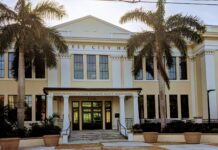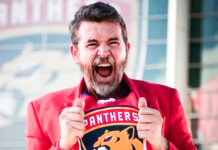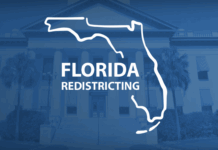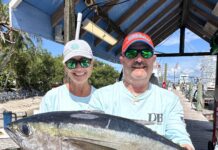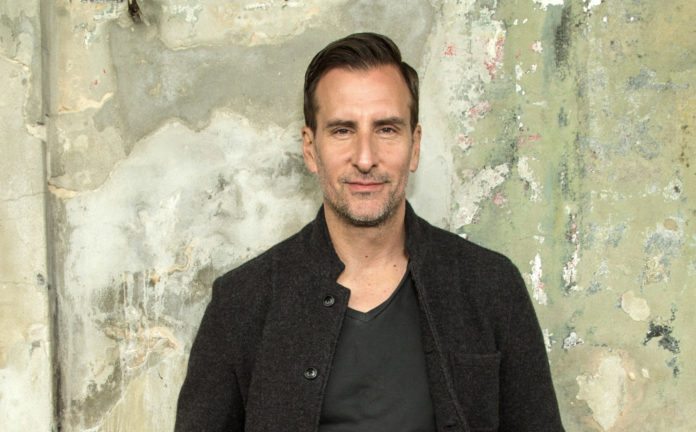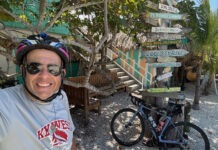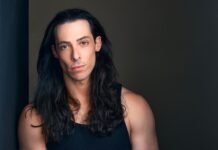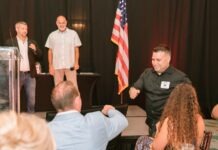When I first heard that Brian Unger had recently traveled to Key West to film his hit Travel Channel show “Time Traveling with Brian Unger,” I was immediately stoked. The show is cutting edge, using modern CGI to recreate historical moments and pivotal events while filming from a modern day location with the ever-engaging Unger playing the role of tour guide. Simply put, it’s one of those shows you come across while surfing channels and you’re instantly hooked. And with this Thursday’s (July 16) episode gearing to air at 8 p.m. on the Travel Channel, all of south Florida will be anticipating just how far Unger and his team were able to go as they rewind the clock and transform Key West into a city on the brink of Armageddon during the Cuban Missile Crisis.
Aside from the obvious excitement over Key West being featured from one of the hottest podiums on television, I must admit that I have star crush on Brian Unger. He is a guy that I’ve followed since his days as an original correspondent of “The Daily Show.” Like many of his contemporaries from that era, Unger was cut from the multifaceted cloth of entertainers who performed comedy, wrote, acted and produced their way to the top.
Throughout the first decade of the 2000’s, it seemed every time there was an equable, cult-comedy-classic, Unger would inevitably make appearances on the show – “It’s Always Sunny in Philadelphia,” “The Man Show,” “Jimmy Kimmel Live,” “Reno 911” and so many others. Unger would add a comedic facet to the set the audience didn’t realize was missing. And whether he was co-hosting alongside Keith Olbermann on MSNBC or interviewing Seth (Zack) Galifinakis, Unger always had a way of subtlety elevating his counterpart without over imposing.
Today Unger is most recognized for his commentary on the “Young Turks” (the largest online news show in the world), while hosting Travel Channel’s “How the States Got Their Shapes” and of course, “Time Traveling with Brian Unger.” In an exclusive Q&A with Keys Weekly Newspapers, Brian Unger took a moment to discuss filming, eating and playing in Key West.
KW: I want to get one thing out of the way before we begin, I’m a big fan, so does that give me permission to reference “Frame Bang” at any point of this interview? [Google reference: “It’s Always Sunny in Philadelphia, Frame Bang.” Mostly SFW]
BU: I think you just did [laughing]. No, that’s great. I’ve never been one to shy away from any kind of praise. So yes.
KW: I was excited to hear “Time Traveling with Brian Unger” made its way to Key West. Have you visted Key West before this recent trip?
BU: Yes, I came to Key West while hosting “How the States Got Their Shapes” but we were not as engaged with the local presence. On this trip I really got to see more of the Key West community and meet more of the people—see who lives there, who works there and who raises families there. And it became more of a community to me and not just a vacation destination.
KW: What was the experience like while you were here in Key West? How were the eats and did you find any of the stereotypes to be true?
BU: I loved Square One and I think I ate there almost every night. They always sat us in a nice, quiet table in the corner, which was great for production planning — and just great food and wine. The rest of the troop went out every night — and let’s just say what happened in those bars, stays in those bars. As far as the stereotypes go, we are a very energetic team that thrives on punctuality and efficiency. Sometimes arranging for logistics or getting vehicles might have taken a little longer than our normal pace, but hey, when in Rome.
KW: Regarding “Time Traveling with Brian Unger,” how do you and your team decide on a location for the show? What type of preparation is involved and how much is done beforehand and onsite?
BU: This is a very intensive, pre-constructed television show that has a very specific format. About 90 percent is done before we arrive and all of the images in the show have to be explored and found before we arrive. We try to come up with images that tell the narrative and it’s a lot of production. But we are always looking for a mix of “then and now.”’ We are looking for images that represent a place — or that juxtaposition that tells a story people may not have considered before.
KW: What is the story you tell in Key West?
BU: We tell the story of very tense days in Key West during the Cuban Missile Crisis — when the world was on the cusp of Armageddon. It shows the history of a place during a time that people take for granted today and the revelation is amazing. It was the militarization of Key West. Key West was on the defensive front lines during the greatest threat in our history. One thousand troops were militarized to defend against any intruder acting against the U.S. and I don’t think a lot of people know how close Key West came to being the tip of the spear.
KW: Any spoilers you can offer before the show airs this Thursday?
BU: First of all, you will dig the images. But one of the things you will see us uncover is the intense meetings that took place at the Truman Little White House. Some were publicized and some were secretive. President Kennedy was there twice, including meetings with the British Prime Minister. Key West went from a sleepy resort town to one that was armed and dangerous.
KW: Why do you think “Time Traveling with Brian Unger” has become so popular with such a diverse audience?
BU: It’s not an academic history show. It’s a show about time and place and in that place there is an excitement. It’s part of the American story that makes all destinations interesting, paying homage to those who lived there and came before. Our show uncovers the depth and tells the narrative about American cities and places, making it very real. My job is to peel back those layers and tell that story to our viewers, travelers and those who live there.
KW: The show is definitely an interesting mix of history, with fun, humor and context. What kind of feedback are you receiving and is it the audience you expected?
BU: The viewers I do hear from want more, but we are just starting a discussion and television is limiting in regard to the time allotted to us. We are offering something that is not on television that much, with much more fun and graphics that brings more value to these stories. The response is positive and I can’t thank our viewers enough.
KW: What kind of perspective have you gained through filming and traveling all over the country?
BU: Being in a union of 50 diverse states, it is kind of a miracle how it holds itself together. In this show I’m learning that every place has a story to tell. In terms of tourism and travel, the most successful states and cities know their stories. Whether it’s the train station, the harbors, the buildings … the more you can protect the more it drives tourism. People have an inherit curiosity that make them want to come when you have a story to tell. That is why Key West is so awesome. It has a great history and it just deepens when you explore the story of the place.
KW: You were covering a great deal about Cuba while filming in Key West. Have you visited Cuba before?
BU: No, like many curious and active travelers this is high on my list. I couldn’t be happier about the diplomatic relations opening up, alleviating the burden of history, and ultimately allowing us the opportunity to travel there.
KW: You’re such an accomplished comedian, and while you do infuse your humor, the show is designed to showcase your other talents as well. Are you ever instinctively tempted to break free and inject more comedy while filming?
BU: I’m always tempted to infuse comedy, it’s my nature. But we are serving a specific show, channel and type of viewer and they expect it all within reason. Ultimately I don’t edit the show and a lot of what I do gets left on the floor—probably with good reason. I think I’m funny all the time. They think I’m funny sometimes. This is probably a good thing.
KW: Craig Kilborn, Danny Devito, Zach Galifinakis , Keith Olbermann, Jimmy Kimmel and Adam Carolla … there are so many names you’ve worked with, all with diverse talents like yours. Who are some of the people in this business that have shaped your ongoing success?
BU: I would say that I’ve been lucky to work with writers and producers, not necessarily on camera, who have motivated me and guided me. “The Daily Show” taught me how to write jokes, but I got to work with producers in the D.C. community that taught me so many things as well. When you work with big talent, you rarely have interface. I would have to give most of my credit for story telling on television to PBS News, sitting in edit rooms and my bosses giving me opportunities to go out. It’s those that are not always the most visible that teach the most.
“Time Traveling with Brian Unger” airs this Thursday at 8 p.m. on the Travel Channel. For more visit: www.travelchannel.com.
